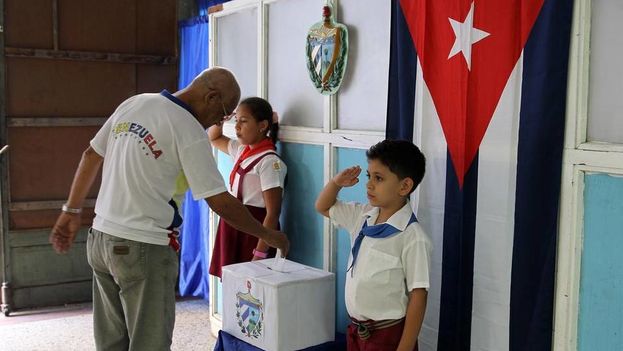
![]() 14ymedio, Reinaldo Escobar, Havana, 21 July 2017 — In recent weeks, the official media have spared no space to explain the details of the Cuban electoral system, which they call “the most democratic in the world.” However, the infographics, data and explanations published so far neglect details that “firmly maintain” the mechanisms to avoid surprises.
14ymedio, Reinaldo Escobar, Havana, 21 July 2017 — In recent weeks, the official media have spared no space to explain the details of the Cuban electoral system, which they call “the most democratic in the world.” However, the infographics, data and explanations published so far neglect details that “firmly maintain” the mechanisms to avoid surprises.
Between September 4th and 30th the candidates for delegates of the People’s Power will be nominated. The process will occur in the different areas which together make up the 12,515 districts distributed across the 168 municipalities of the country. On this occasion, it is the first step in Raúl Castro’s departure from power in February 2018.
The call for citizens to participate in these assemblies is traditionally issued by the Committees for the Defense of the Revolution (CDR) Organization, with a clear political origin and a strong ideological affiliation. From wall signs, personal reminders, to written citations, all are a part of the strategies to call people to vote.
In the days leading up to the meetings, the Communist Party of Cuba (PCC) militants who live in each zone meet to agree on the positions depending on the directions that come from the higher levels. In these meetings they are warned how they should act in case any disaffection toward the Revolution is proposed, and which candidate enjoys the PCC’s sympathy.
Only voters of the district have the right to propose and be proposed in the assemblies of each area. In order to do so they have to ask for the floor, speak in the order granted to them and briefly explain the reason for their proposal. The nominee must show his agreement with being proposed and only then will he or she be put to a vote.
All voters may express their opinion for or against the candidate and the vote is made directly and publicly, in the same order in which each candidate was proposed. Each attendee has the right to vote for only one nominee and in the event of a tie a new nomination is initiated.
When the Electoral Law in its article 83 remarks that the vote is “public,” it minimizes one of the most important keys of the electoral system of the Island and that make it more controllable by the powers that be. At that initial stage of nomination, voters must express their preference by show of hands, that is with their faces uncovered. In a country full of masks and fears, few dare to show their neighbors a preference for a critical citizen.
When in one of these assemblies an elector proposes a candidate with a reputation of being politically uncomfortable, he knows that, immediately, the militants of the neighborhood will request the floor to discredit the nominee. The mechanism of “cauterization” of any nomination that does not conform to the tastes of the ruling party will be activated immediately.
In the midst of the meeting, a member of the PCC will warn in a loud voice, “this man is in the pay of the empire,” and someone else will speak up to express his doubts because someone “who feels himself to be Cuban votes in favor of this mercenary…” The performance seldom has to be carried out, because the instinct for self-preservation dissuades the majority of voters from suggesting a dissident for delegate.
They find it so difficult to encounter someone who, from dissenting positions, aspires to be a delegate, or to find another who dares to propose one to the assembly. How many will raise their hands in favor of a dissident after the militants make it clear they do not like the nomination? Almost nobody. This simple trick will have ensured the first and most important purge of the electoral system.
To ensure the minimum secrecy required by the vote, it would be enough to distribute a simple piece of paper among each of the participants so they could write the order of their candidate preferences. But that would add the privacy that the ruling party wants to avoid at all costs.
This variant would have the added value of eliminating the chance that someone, in the midst of counting the raised hands, violates – consciously or otherwise – the provision that allows each person to vote for only one candidate. In short, it would smooth out the process and make it more democratic and effective.
Not for nothing, was the elimination of voting on the nomination of candidates by a show of hands one of the proposals most repeated by those who believe that the current electoral process would be governed by new legislation as promised by Raul Castro in February 2015.
Changing what looks like a detail of slight importance, a methodological pedantry, would open a space for the plurality of citizen participation; it would allow us to express ourselves without fear on a critical topic: the presence of different thinking among the base.
Keeping the first piece of the Cuban electoral framework as it is now is only a way of perpetuating the fear that harms the civic action of a good part of the population. It is precisely the suppliers of this fear who prefer to leave things as they are.
